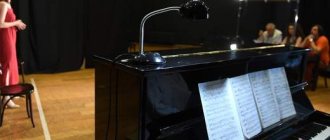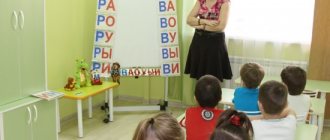Photo source gpointstudio/freepik
A defectologist is a specialist who works with children who have mental or physical disabilities. A person in this profession has knowledge of methods for adapting children to the environment, and is engaged in their training and education.
Introduction
The health problems of preschoolers and primary schoolchildren are causing serious concern today.
According to the State Report “On the State of Children’s Health in the Russian Federation,” 20% of preschoolers have health problems, and in primary school this percentage increases to 50%. During the period of schooling, the number of healthy children decreases by 4 times, the number of children with myopia, neuropsychiatric disorders, postural disorders, etc. increases. The causes of developmental disorders in children have always interested humanity. The issue of systematizing this information has so far undeservedly remained without due attention. Currently, most of these reasons have been established and reflected in the medical literature. But there is still no consensus on what stage of an individual’s development and which reasons (or groups thereof) dominate. For example, when it comes to intellectual disabilities, 90% of cases are attributed to prenatal problems, 3% to perinatal problems and 7% to postnatal problems.
The spectrum of developmental disorders is very wide. For the biological usefulness of an individual, social and psychological factors are significant, and from a psychological and social point of view, biological factors are also significant for a fully developing personality [3].
The problem of children's health today is more relevant than ever. We adults are accustomed to believing that the most important thing for children is to study well. Is it possible to study well if you are dizzy, if your body is weakened by illness, if it does not know how to fight illness. It is obvious that medical innovations alone cannot fully ensure a significant improvement in children's health unless certain changes occur at the level of educational institutions in the organization of the educational process.
Currently, we can say with confidence that it is the teacher who is able to do more for the health of a modern student than a doctor. This does not mean that the teacher must perform the duties of a medical worker. It’s just that the teacher must organize his activities in such a way that the education and upbringing of children in the institution does not cause harm to health. After all, only a healthy child is able to successfully and fully master the educational program. And health problems, as a rule, lead to difficulties in learning, especially if conditions for the normal functioning of the body of students and pupils are not created in the class or group.
Currently, a teacher-defectologist cannot simply be a source of knowledge, because... The demands of modern society run counter to the academic education that school provides. Since our country needs people of a new quality who are able to act independently, provide for themselves and others, be responsible for their work, and, above all, must act as an organizer and coordinator of the educational process and teach children to acquire knowledge, objectively assess themselves and their capabilities, and work independently and be responsible for the results of their work. And in order to achieve respect and love from children, you need to prove that you are worth it. How to do it? For every teacher, the emotional-value and creative sphere of activity, as well as knowledge of competencies, are very important. A professional teacher must have internal motivation for high-quality implementation of his activities. One of the main qualities of a teacher-defectologist is his willingness to help. One of the essential qualities is his professionalism. Nowadays, children can obtain almost any information on their own, so we simply need to update and expand our knowledge.
8 pages, 3528 words
Psychological support for the process of adaptation of young children to preschool
... that the nature of adaptation of a young child is a prognostic test for characterizing the dynamics of the child’s health during his adaptation ... research indicates that currently only 10% of children in senior preschool and 5% of children ... Clear, professionally coordinated and thoughtful work of psychologists and teachers and doctors, a favorable microclimate in a preschool institution, ...
Educational activities become brighter, livelier and more interesting if the teacher’s facial expressions and pantomimes show that he himself is interested in the educational process. Children feel that they are interested in them. One of the most important factors influencing professionalism is self-education. The search for new techniques, methods and technologies is especially relevant in our time. It is almost impossible to force a child, a representative of the new generation, to do something unless you reach an agreement with him or interest him. Therefore, it is necessary to choose technologies that would make it possible to achieve this. Technologies should contribute to the development of children’s key competencies: research, social-personal, communication, organizational, personal-adaptive, information and key competencies: the ability to work without constant guidance, the ability to take responsibility on their own initiative, the ability to master any knowledge on their own initiative, the ability to analyze new situations and apply existing knowledge for analysis and generalization.
The competency-based approach is a relatively new perspective in the study of educational problems. The concepts of “competence”, “competence”, “competency approach” as systemic educational and pedagogical categories have entered intensively into the conceptual apparatus of the sciences of education.
The professional competence of a teacher-defectologist influences all areas of his pedagogical activity, the content of which is largely determined by the nature of interaction with all participants in the correctional educational process. In modern conditions, full assistance to the development and education of a child with special needs is possible only in a broad sociocultural and interpersonal context, therefore, a teacher-defectologist must involve both various social partners and many highly specialized specialists in the educational process. The success of correctional and developmental intervention is directly related to the ability of a teacher-defectologist to build positive relationships with parents, children and colleagues in the form of active interaction, and the latter is determined, among other things, by the degree to which the defectologist has developed social competence.
8 pages, 3702 words
Creativity of preschool children “Development in visual activities.” ...
... visual activities of a preschooler, after which I build individual work with children, ... visual activities. A relatively high level of independent activity is manifested in the child’s setting of increasingly diverse goals (determining the themes of the image) according to the impressions that concern him. Child, ... activities. For personal development, it is important that a child…
Personal qualities of a defectologist
To work with abnormal children and perform professional duties, a defectologist must have certain personal qualities, which include:
- patience, balance, stress resistance;
- responsibility;
- ability to work with difficult children;
- love for children and your profession;
- communication skills.
When working with a child, a defectologist must see his pupil as a full-fledged person, show interest in everyone, observe, identify the causes of deviations, try to provide help, prevent possible undesirable consequences, etc.
Principles of work of a defectologist:
1) Using an integrated approach to monitoring, correction and rehabilitation, based on compliance with the principle of unity of diagnosis and correction. Monitoring is an integral part of a comprehensive study of the child by specialists of the psychological, medical and pedagogical council of the preschool educational institution. The results of the defectological examination are necessarily compared with psychological, speech therapy, medical, pedagogical data and discussed at council meetings.
2) Implementation of an etiopathogenetic approach to the analysis of disorders. The mosaic pattern of damage to the central nervous system with mental retardation of cerebral-organic origin leads to significant heterogeneity of impaired and intact parts of the child’s mental activity, to pronounced unevenness in the formation of its different aspects and determines the need for a differentiated approach in the work of a teacher-defectologist in overcoming the difficulties of pupils.
3) Taking into account the age and individual characteristics of the child’s development, based on maximum activation of the “zone of proximal development”. The content of educational activities is built within the framework of the leading activities of preschool age, on material that meets the requirements of the preschool program. Corrective and developmental exercises are selected in such a way that, on the one hand, they are accessible to the pupils, and on the other hand, their level of complexity allows them to activate the child’s potential capabilities. Various types of assistance are widely used in classes - from minimal to maximum.
4) Implementation of interdisciplinary interaction of specialists, the nature of which is determined by the structure of the violation and the primary objectives of corrective action. In the process of comprehensive monitoring, aspects of the child that need correction are identified, comprehensive programs for his development are drawn up, which should include priority areas of correctional work for each specialist, the total workload on the student, recommendations for the teacher and parents.
5) Organization of dynamic monitoring of the development of children, which is carried out with the aim of tracking the dynamics of the child’s development, determining the compliance of the selected forms, techniques, methods of teaching with the level of development of the student. In the process of dynamic study, the problems of differentiating similar conditions of developmental disorders are also solved.
6) Systematic conduct of a correlative analysis of the state of formation of knowledge, abilities, skills and psychophysical development of the child. Comparison of the child’s actual achievements with the development of the cognitive sphere allows us to adjust correctional programs, outline “workarounds” in education, vary the teaching methods of the teacher, and choose adequate forms of education in each individual case.
Defectologist salary
Photo source prostooleh/freepik
The salary of a speech pathologist in Russia depends on the region of residence and place of work. Thus, in government institutions, the salary of a specialist in this profile can be 15-20 thousand rubles, in Moscow and St. Petersburg - 35-60 thousand rubles. Work in private institutions (including the provision of private professional services) pays more. An employee can receive up to 80 thousand rubles per month. and higher (depending on job responsibilities).
Contents and levels of mastery of competencies
— Ability to design preventive and correctional-developmental programs for children with different types of disabilities;
4 pp., 1673 words
Value orientations of students as the basis for the development of their professional...
... means of developing professional value orientations of students at the university. The purpose of the work is to reveal the essence of students’ value orientations as the basis for the development of their professional activities. Object... consciousness. A clear structuring of the value sphere of the individual is necessary for constructing programs for the development of value orientations. Problems of professional value orientations of students were considered...
— knowledge of the basic principles of developing preventive and correctional and developmental programs for children with disabilities;
— understanding the essence, objectives, methods of preventive and correctional and developmental work with children with different types of disabilities;
— the ability to design activity programs based on modern scientific approaches to preventive and correctional and developmental activities, monitor the results of the implementation of preventive and correctional and developmental programs;
— willingness to interact constructively with related specialists on issues of developing the abilities of children and adolescents with disabilities;
— have an idea of the peculiarities of working with children with developmental disorders by defectologists, social workers, social educators, psychologists, art teachers, physical education teachers, etc. Knowledge of the basics of the psychology of group interaction. Understanding the specifics of the work of an educational psychologist in a general team of specialists;
— the ability to organize interaction between specialists in matters of developing the abilities of children and adolescents with disabilities, monitor the effectiveness of interaction between specialists and make appropriate adjustments;
— knowledge of the structure of the educational environment, methods for diagnosing components of the educational environment, methods for identifying violations in the behavior and development of children and adolescents with disabilities. Understanding the relationships between the peculiarities of the functioning of the educational environment and the difficulties that arise among subjects of educational disorders in the behavior and learning of children and adolescents with disabilities;
the ability to monitor the educational environment, analyze diagnostic results, identify and explain the causes of difficulties in learning for children and adolescents with disabilities;
the ability to provide psychological assistance in optimizing the pedagogical process in correctional educational institutions;
— the ability to provide psychological support to participants in the pedagogical process, conduct discussion and analysis of existing problems to solve problems of optimizing the pedagogical process;
— ability to advise teachers, administration, pupils/students on issues of optimizing the educational process in correctional educational institutions:
— knowledge of the basics of psychological counseling;
— understanding the interrelationships between the use of methods of the educational process and the mechanisms of the child’s educational and cognitive activity;
— the ability to select methods of interaction with specialists, parents, children during consultations, and monitor the effectiveness of the work being carried out.
Types of speech pathologists
There are several areas of defectology depending on the problems being solved. The following specialists are identified:
- Speech therapist - helps children correct their speech and identify individual sounds
- Teacher of the Deaf – works with children who have difficulty hearing
- Oligophrenopedagogue - works with children with mental retardation
- Typhlopedagogue - helps children with visual impairments adapt
- Orthopedic teacher - works with children who have impaired musculoskeletal system functions
This division in some cases may be conditional. Often, children with disabilities have impairments in several areas at once, so a professional defectologist with one chosen specialization must also understand other areas.
Comprehensive prevention of developmental disorders in young children
Over the past decades, negative phenomena in the health of children have been increasing. With developmental anomalies, with long-term illnesses of early age, pronounced disorders can occur, which lead to limitation of life and social functions, in the most severe cases leading to social failure. The literature indicates a high prevalence of developmental disorders in children. This percentage, without significant changes, is observed throughout the early and preschool years - on average for all parameters - 65%. Developmental disorders in young children affect further mental and intellectual development, and the problem acquires not only medical and pedagogical, but also social significance. The problem of integrating children with developmental disorders into the general developmental environment poses a task for specialists - the search for new, holistic forms of early prevention, which simultaneously prevents the worsening of general underdevelopment and contributes to the formation of a developing human personality in all its manifestations[7].
13 pages, 6430 words
Development of musical and creative abilities of secondary preschool children...
... the process of development of musical and creative abilities of children of middle preschool age. SUBJECT OF RESEARCH: pedagogical conditions for the development of musical and creative abilities of children of middle preschool age in... PROBLEM: search for psychological and pedagogical conditions for the musical and creative development of children of middle preschool age through nurturing their musical and creative abilities...
The concept of preventing developmental disorders in children is based on the principle of a differentiated approach, taking into account the state of health, the complexity of the use of medical, psychological, pedagogical and social methods of rehabilitation using all possibilities, that is, the creation of a common correctional space. The system of early comprehensive prevention we propose is structurally medical, psychological and pedagogical. In our opinion, it is necessary to begin comprehensive preventive work already in the antenatal clinic, where the expectant mother is being observed. Considering the limited capabilities of antenatal clinics, the absence of neonatologists-pediatricians, neurologists, defectologists, psychologists and child psychiatrists in these institutions, it is necessary to use visual and poster forms of education, educational booklets for future parents about the normal development of the child and possible deviations. These stands and booklets in an accessible form can help parents understand the following questions: what are developmental deviations, why a child may be at risk, how and when to start communicating with the baby, how the family situation can influence development. In addition, they can perform a coordinating, dispatching function and form an attitude in adults about the need for timely contact with specialists - a speech therapist, psychologist, psychiatrist, neurologist, which makes it possible to specify early forms of habilitation. An extremely important task in this regard is the prevention of emotional and sensory deprivation.
At the same time, the positive results of complex correctional interventions are directly related to the correct organization of correctional interventions at home. First of all, this is the establishment, under the guidance of specialists, of partnerships: doctor - parents, special education teacher - parents, psychologist - parents, with the aim of the active participation of parents in enhancing the mental and general development of the child. Secondly, the complexity and integrity of the impact make it possible to stimulate, “observe” and direct the development of the child not only in an organized form, but also in natural, home conditions. The system and methodological approaches developed and tested in various organizational forms make it possible not only to obtain adequate adaptation and a correction effect, but, what is especially important, to eliminate diagnostic errors in assessments of cognitive activity that lead to a limitation of the social perspective of the child and his family. At the same time, pharmacological influence and psychotherapeutic support are necessary parts of a general correction program that helps restore or improve the state of speech activity, communication, neuropsychic processes, emotional and behavioral reactions.
7 pages, 3221 words
Topic: features of mental development of children with sensory impairments
... the mechanisms of influence of a primary defect on the occurrence of a complex hierarchical series of secondary disorders that determine the development of the child as a whole. In the model of a sensory defect, the reverse is also indicative... of a narrow range of concepts that narrows the development of the level of generalization. A specific disorder in the development of the emotional sphere is of great importance. Thus, in a blind child, the underdevelopment of the emotional sphere is associated...
Behavioral difficulties in children of this group are associated with disorders of the nervous system and higher mental functions, with existing emotional discomfort. An incorrect stereotype of a child’s behavior is reinforced by the incorrect and inadequate attitude of adults towards him. Parents need to understand why the child develops atypically, differs from other children in behavior, and has developmental delays. Such children cause a lot of trouble for adults with their behavior. Parents, as a rule, have a hard time dealing with the negative reaction of others to the behavior of their children. They experience a feeling of helplessness, confusion, and shame for their child. This turns into irritation against the child and leads to conflicts in the family due to upbringing. Each family member begins to accuse others of self-indulgence, excessive severity, etc. In the future, this leads to uneven behavior of adults towards the child, which aggravates the situation and has a detrimental effect on the child’s condition, leading to the consolidation of pathological behavioral reactions. That is why psychotherapeutic support is required as a restructuring, reconstruction of risk factors in a child, as a recreation of harmonious relationships in the family. All components of risk factors and the connections between them are subject to psychotherapeutic support; The psychological climate of the family is normalized, parental positions in relation to children are reconstructed, parents’ awareness of the motives of family upbringing is expanded, the very course of mental development of children in the family is harmonized, the child’s self-awareness and self-esteem are developed and harmonized.
In turn, the original correctional pedagogical program structurally includes two parts: 1 – preparing parents for cooperation with specialists; 2 – direct (with a correctional teacher) and indirect (with parents) classes with the child.
Work with parents is conventionally divided into propaedeutic and main periods. The purpose of the propaedeutic period is not only to prepare the child for new forms of education, training and integration (full, incomplete or partial) into the social environment, but also to adapt the parents to the child’s condition. The influence of parents on the child during the main period can be anticipatory, parallel and reinforcing. In this regard, the development of the content of a program of complex medical-psychological-pedagogical influence includes modeling adequate social and role behavior of both adults and children; teaching a new mode of intrapsychic, interpersonal and communicative relationships. The originality of the program lies in the fact that the entire life activity of a child with deviated development is covered by stimulating the appearance of speech, the development of detailed statements, linguistic flair, linguistic competence, and the formation of creative forms of speech and cognitive activity. An important feature of the program is to stimulate the development of speech in children by teaching them to read.
The program is built from mutually complementary methodological blocks, built on a concentric principle. The content of the blocks is dynamic, which allows you to include not only a gradual complication of the material, but also take into account the individual characteristics of the child and the cognitive style of perception, awareness and assimilation of information. Each block involves the parallel work of a speech therapist, other specialists and parents. The effectiveness and optimality of the application of the proposed approaches is confirmed by the positive results of our work with children suffering from severe developmental disorders: disorders of the development of expressive and impressive speech, delays in the rate of speech and intellectual development, delays in mental development[7].
9 pages, 4308 words
Psychological and pedagogical assistance to families with children with developmental disabilities
... Parents of children with developmental disabilities take an active part in the creation of parental associations, educational foundations, charity centers and social partnerships (Down Syndrome Society; "Association of Parents of Children with Disabilities ... such programs will reduce the likelihood of developmental delays in infants and young children from risk groups, will increase the competence of family members in satisfying...
To prevent developmental disorders in children, specialists and especially future parents should know the main directions for preventing this phenomenon.
Genetic counseling is useful in family planning. Such consultations are necessary for parents in the so-called risk groups. Factors causing risk:
- hereditary diseases in parents or members of their families;
- congenital mental retardation;
- congenital hearing or vision impairments;
— physical development disorders: bone deformations, changes in joint mobility;
- primary infertility or amenorrhea (absence of menstruation);
- two or more miscarriages;
- at least one pregnancy was terminated due to impaired fetal development;
- sudden death of an infant due to unclear reasons;
- mother’s age over 35 years;
- blood marriages, etc.
Parents at risk should attend medical and genetic consultations, whose specialists will inform them about the possibilities of having children with hereditary developmental disorders, as well as the risks of having children with developmental pathologies.
All women need to undergo prenatal diagnosis, which is essential for solving the problem of family planning.
If possible, it is advisable for pregnant women to visit prenatal centers for psychological support of pregnancy.
Immunization of children is very important. Timely immunization of children prevents dangerous infectious diseases that lead to developmental disorders.
One of the few causes of developmental disorders, the prevention of which directly depends on parents and teachers, is injuries to children. All types of injuries are dangerous, both domestic and street, and sports. The most dangerous are open and closed head injuries, which cause not only a concussion, but can also cause damage to centers (vision, speech, etc.), due to which certain functions may be impaired. We would advise families with small children not to purchase double-decker cribs. Children under 6 years old should not sleep in such cribs. Children of this age still sleep restlessly, so they may fall out of bed. Scottish traumatologists note that over the course of months in this country, 85 thousand children became their patients, of whom only 85 received minor bruises, the rest ended up in the hospital due to concussions, broken bones or other injuries. Half of the affected children were under 18 years of age. Even if a preschooler does not sleep on the second tier, such furniture remains a risk factor, since it is very attractive for play. Even in an ordinary crib, you should not put large toys and pillows, as babies may fall out if they stand on them.
3 pages, 1016 words
“Theory and methodology of physical education and development of early childhood...
... have an educational effect on him. Physical education contains unlimited opportunities for the comprehensive development of a child. It helps him reveal his motor abilities, mobilize mental and physical... 2021. - 192 p. 23. Yakubovich, M.A. Correction of motor and speech disorders using physical education methods / M.A. Yakubovich, O.V. Presnova. - M.: Vlados, 2021. ...
When babies begin to walk, in order to avoid accidents, parents should consider the safety of each living space, as children of this age become real explorers.
Only with a rational approach to preventing the causes of developmental disorders by parents and teachers of child care institutions will it be possible to minimize the portion of acquired developmental disorders in children [3].
How do speech therapists differ from speech pathologists?
Speech pathologists are often confused with speech therapists, so it is important to understand their differences.
Speech therapists work only with healthy children who pronounce certain sounds or words incorrectly. A speech pathologist works with children whose speech difficulties are associated with various diseases or developmental delays. For example, a child suffers from a disease of the central nervous system, so he has speech impairments.
If you plan to work with healthy children, you need to study to become a speech therapist. And if with children with disabilities (disabilities and developmental disabilities), contact a defectologist.
Bibliography
1. Aksenova, L.I., Arkhipov, B.A., Belyakova, L.I. Special pedagogy: Academic. A manual for students. higher ped. textbook Establishments [Text] / L.I. Aksyonova, B.A. Arkhipova, L.I. Belyakova et al.: Ed. N.M. Nazarova. – 2nd ed., - M.: Publishing House, 2001.-400 p.
2. Bidenko, V. I. Bologna process: problems, experience, solutions. − M.: Research Center for Problems of Quality of Training of Specialists, 2006. Borytko, N. M. Man as a subject of education: modern approaches // Pedagogical anthropology: conceptual foundations and interdisciplinary context. Materials Int. scientific conf. (Moscow, September 30–October 2, 2002) / Comp. V. G. Bezrogov - M.: Publishing house URAO, 2002. - P. 40−43.
3. Gudonis, V.P. Analysis of the causes of developmental disorders in children and some ways to prevent them. [Test] / V.P. Gavrilov // Defectology. – 2004. No. 4. - With. 16-17.
4. Suntsova, A. S. Theories and technologies of inclusive education: textbook. − Izhevsk: Udmurt University, 2013.
5. Professional standard of a teacher. − Order of the Ministry of Labor and Social Protection of the Russian Federation No. 544n dated October 18, 2013.
6. Prevention, diagnosis and correction of developmental disorders / Ed. Lynskoy M.I., Pokrovskoy Yu.A. – M.: LOGOMAG, 2012. – 284 p.
7. Candidate of Pedagogical Sciences, Associate Professor at Moscow State Pedagogical University, Davidovich, L.R. Comprehensive prevention of developmental disorders in young children [Text] / L.R. Davidovich [Electronic resource]. – Access mode: https://pik100.ucoz.ru/konf/patologia/davidovich.htm
Examples of similar educational works
Psychological adaptation of orphans and children left without parental care...
... children left without parental care, aged 12 to 14 years, and 10 foster families. Work structure. The work ... of a child in an orphanage in most cases leads to disturbances in his development ... as a person with a new type of activity, social role, ...
Technology of post-boarding support for orphans and children left behind...
... and children left without parental care, both in the work practice of the institution’s specialists and in the work practice of specialists ... on the approval of criteria and indicators for assessing the activities of the Institution for working with graduates at a meeting of the Council for ...
Pedagogical conditions for the socialization of orphans and children left without parental...
... activities of orphans and children left without parental care; The theoretical and methodological basis of the study are: the cultural and historical concept of child development and the position on the unity of the laws of development of a normal child and a child...
Social and psychological rehabilitation of children left without parental care...
... children left without parental care are a socially unprotected group, whose members have significant difficulties with socialization and/or mental health, ... mental production (activity) and its results; ... the topic of the work, and ...
Fairytale therapy as methods of psychological assistance to children in situations of parental divorce
...a parent. When a serious breakup occurs and the parents decide to separate, for a child of any age... the future cannot be drawn. It’s better not to talk about adultery… children tend to lag behind in development. How to mitigate negative consequences: children...
How to remotely obtain qualifications as a teacher-defectologist at the Academy
If you have a university diploma, you can undergo a professional retraining program at the Academy. You can choose one of the areas of special pedagogy: Defectology, Speech Therapy, Typhlopedagogy, Oligophrenopedagogy. After completing it, you will receive a diploma with a qualification and learn how to effectively manage the development process of a child with disabilities.
Training takes place in a distance format. You sign up for the program and complete it in a convenient schedule, at any time convenient for you in the LMS system on the Academy website.
There is no need to install any additional software. The program meets the requirements of the Federal State Educational Standard and professional standards, and the Academy has a state educational license, so having this diploma and knowledge from the course will give you the opportunity to work in various institutions as a special education teacher.
The program developers are highly qualified specialists with extensive experience. Each student receives individual support; all questions during the training process are answered by an assigned methodologist.
Upon completion of training, a diploma of professional retraining of the established form is issued with the assignment of qualifications. The education document must be entered into the state database of the FIS FRDO and sent free of charge to any region and city of Russia.
General provisions
1.1. A teacher-defectologist is a pedagogical worker and is directly subordinate to [name of the position of the immediate supervisor].
1.2. A person with a higher professional education in the field of defectology is accepted for the position of a teacher-defectologist, without presenting requirements for work experience.
1.3. For the position of teacher-defectologist in accordance with the requirements of Art. 331 of the Labor Code of the Russian Federation, a person is appointed:
- not deprived of the right to engage in teaching activities in accordance with a court verdict that has entered into legal force;
- does not have or has not had a criminal record, has not been or has not been subject to criminal prosecution (with the exception of persons against whom criminal prosecution has been terminated on rehabilitative grounds) for crimes against life and health, freedom, honor and dignity of the individual (with the exception of illegal placement in a psychiatric hospital, slander and insults), sexual integrity and sexual freedom of the individual, against family and minors, public health and public morality, the foundations of the constitutional order and state security, as well as against public safety;
- does not have an unexpunged or outstanding conviction for intentional grave and especially grave crimes;
- not recognized as legally incompetent in the manner prescribed by federal law;
- does not have diseases included in the list approved by the federal executive body exercising the functions of developing state policy and legal regulation in the field of healthcare.
1.4. A teacher-defectologist is appointed to the position and dismissed from it by order of [name of the manager’s position].
1.5. A teacher-defectologist should know:
— priority directions for the development of the educational system of the Russian Federation;
— laws and other regulatory legal acts regulating educational, physical education and sports activities;
— Convention on the Rights of the Child;
— developmental and special pedagogy and psychology;
— anatomical, physiological and clinical foundations of defectology;
— methods and techniques for preventing and correcting deviations in the development of students and pupils;
— normative and methodological documents on issues of professional and practical activity;
— program and methodological literature on working with students and pupils with developmental disabilities;
— the latest achievements of defectological and pedagogical sciences;
— labor protection and fire safety rules;
— theory and methods of managing educational systems;
— modern pedagogical technologies for productive, differentiated, developmental education, implementation of a competency-based approach;
- methods of persuasion, argumentation of one’s position, establishing contacts with students, pupils of different ages, their parents (persons replacing them), work colleagues;
— technologies for diagnosing the causes of conflict situations, their prevention and resolution;
— fundamentals of ecology, economics, sociology;
— labor legislation;
— basics of working with text editors, spreadsheets, email and browsers, multimedia equipment;
— internal labor regulations of the educational organization;
— labor protection and fire safety rules.
1.6. A teacher-defectologist is prohibited from:
— provide paid educational services to students in this organization, if this leads to a conflict of interests of the teacher-defectologist;
- use educational activities for political agitation, forcing students to accept political, religious or other beliefs or renounce them, to incite social, racial, national or religious hatred, for agitation promoting the exclusivity, superiority or inferiority of citizens on the basis of social, racial, national, religious or linguistic affiliation, their attitude to religion, including by communicating to students false information about the historical, national, religious and cultural traditions of peoples, as well as to induce students to take actions contrary to the Constitution of the Russian Federation.










